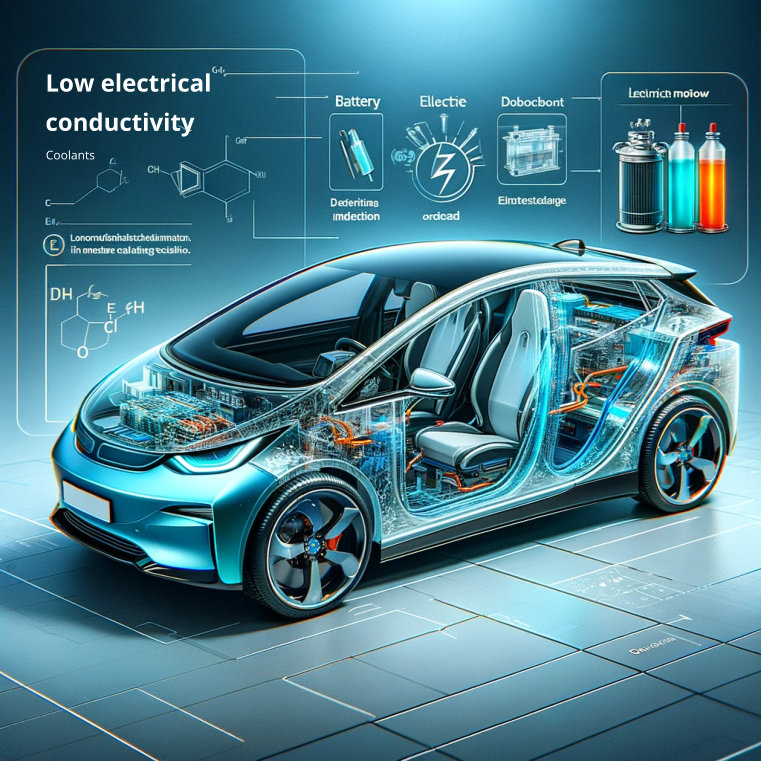
Enhancing Efficiency and Performance: The Importance of Low Electrical Conductivity Coolants in Electric Vehicles
Introduction:
As the automotive industry undergoes a transformative shift towards sustainable and eco-friendly solutions, electric vehicles (EVs) have emerged as a leading contender in the race for a cleaner future. While the focus has predominantly been on battery technology and motor efficiency, the role of low electrical conductivity coolants in enhancing the overall performance of EVs is often overlooked. In this blog post, we delve into the importance of low electrical conductivity coolants in today’s electric vehicles and how they contribute to efficiency, longevity, and safety.
- Heat Management in Electric Vehicles:
Effective heat management is crucial for the optimal functioning of electric vehicles, especially considering the heat generated during the charging and discharging of batteries and the operation of electric motors. Traditional vehicles rely on liquid cooling systems to dissipate excess heat produced by the engine. Similarly, electric vehicles utilize coolants to regulate the temperature of various components, ensuring they operate within the optimal temperature range.
- Challenges of Electrical Conductivity in Coolants:
The choice of coolant in an electric vehicle is pivotal, and one of the key considerations is its electrical conductivity. High electrical conductivity in coolants can lead to several challenges, such as increased risk of electrical shorts and corrosion within the vehicle’s electrical components. This is particularly critical in EVs, where sophisticated electronic systems and high-voltage batteries are integral to their operation.
- The Role of Low Electrical Conductivity Coolants:
Low electrical conductivity coolants play a pivotal role in mitigating the challenges posed by high electrical conductivity alternatives. Here’s why they are essential in today’s electric vehicles:
Reduced Risk of Electrical Shorts:
Low electrical conductivity coolants act as insulators, reducing the risk of electrical shorts within the vehicle’s intricate electrical systems. This is vital in maintaining the reliability and safety of an electric vehicle.
Corrosion Prevention:
High electrical conductivity can accelerate corrosion in the electrical components of an EV. Low electrical conductivity coolants create a protective barrier, preventing corrosion and extending the lifespan of critical components.
Enhanced Thermal Efficiency:
Efficient heat dissipation is essential for the longevity and performance of electric vehicle components. Low electrical conductivity coolants aid in better heat transfer, ensuring that the vehicle’s systems operate optimally even under demanding conditions.
- Longevity and Performance Benefits:
The utilization of low electrical conductivity coolants translates into tangible benefits for electric vehicles, contributing to their longevity and overall performance. Some key advantages include:
Extended Component Lifespan:
By minimizing the risk of corrosion and electrical shorts, low electrical conductivity coolants contribute to the extended lifespan of sensitive electrical components, ultimately reducing maintenance costs for EV owners.
Consistent Performance:
Maintaining a stable temperature is critical for the consistent performance of electric motors and batteries. Low electrical conductivity coolants help achieve this by efficiently dissipating heat and preventing overheating.
Energy Efficiency:
Efficient heat management results in improved energy efficiency, as the vehicle’s electrical systems operate more effectively when maintained within the optimal temperature range. This, in turn, positively impacts the overall range and performance of the electric vehicle.
Environmental Considerations:
Beyond the direct benefits to the performance and longevity of electric vehicles, the use of low electrical conductivity coolants aligns with the broader environmental goals of the EV industry. These coolants contribute to the sustainability of electric transportation by minimizing the environmental impact associated with the production and disposal of high-conductivity alternatives.
Conclusion:
As the electric vehicle revolution continues to gain momentum, the importance of low electrical conductivity coolants cannot be overstated. These specialized coolants not only ensure the safety and longevity of EVs but also contribute to their energy efficiency and overall performance. As automakers and technology providers strive to enhance the capabilities of electric vehicles, integrating low electrical conductivity coolants into their design becomes a crucial step towards realizing the full potential of clean and sustainable transportation.

